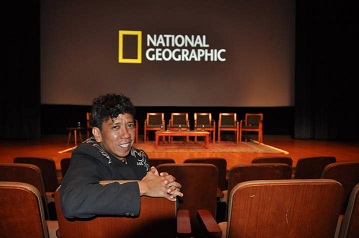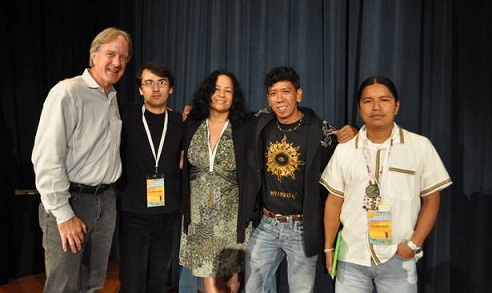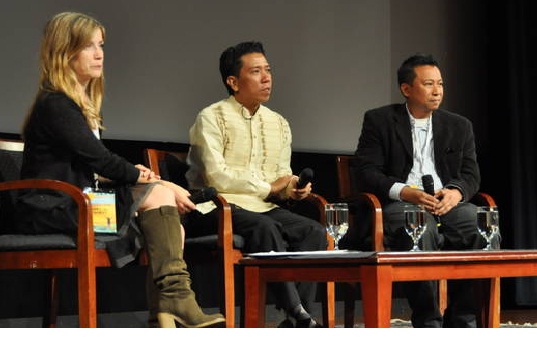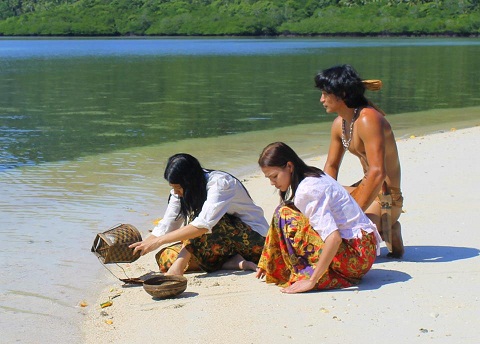By PABLO A. TARIMAN
Photos by RAFFY GOROSPE
AURAEUS Solito’s “Busong” — which was premiered last year at the Cannes International Film Festival’s Directors Fortnight section — continued its winning streak by running away with the grand prize in the recently concluded National Geographic All Roads Film Festival in Washington D.C.
The grand prize in the festival — the Merata Mita Award — was named after the late New Zealand filmmaker who championed the Maori film industry.
The Filipino filmmaker — also known for his commercially successful “Ang Pagdadalaga ni Maximo Oliveros” (The Blossoming of Maximo Oliveros)- said the award was a complete surprise as he was busy doing a projection test for the Filipino entry which happened to be the opening film. “Someone picked me up and I was advised that I have to be in the reception. Suddenly the festival director, Francine Blythe, goes to the stage and announced the winners. She first announced Best documentary then Best Narrative. So I thought, I lost. Then suddenly she announced the final award- the grand prize- the Merata Mita Award- Honoring a Legacy of Outstanding Storytelling.
Blythe emphasized that the grand prize was about storytellers in all categories.
The winners were announced Friday night (September 28) at the National Geographic headquarters in Washington DC. By a jury headed by Tom O’Neill and the All Roads Board of Directors and staff writers of National Geographic Magazine.
In his acceptance speech, Solito said it was such a great honor to receive an award named after the late great Maori filmmaker. “I actually met her six years ago in the ImagineNative Film Festival in Toronto. I didn’t even know she passed away. And I thanked my ancestors who passed their stories through word of mouth, and to my Mom who passed my ancestors’ stories to me. Now I pass these stories through the digital medium, so that the world will see the Palawanon’s untold stories in cinema.”
 “Busong” was premiered last year at the Cannes Directors’ Fortnight and the event he considers a dream come true for him. “Busong won three awards (Best Director, Best Original Score & Best Sound ( for Diwa de Leon) at the Cinemalaya 2011.It went on to win the FIPRESCI Prize, the International Federation of Film Critics at the Eurasia Film Festival and the “Cinema of Tomorrow” award at the Brussels International Independent Film Festival. “So this is the 6th award for Busong,” added the film director.
“Busong” was premiered last year at the Cannes Directors’ Fortnight and the event he considers a dream come true for him. “Busong won three awards (Best Director, Best Original Score & Best Sound ( for Diwa de Leon) at the Cinemalaya 2011.It went on to win the FIPRESCI Prize, the International Federation of Film Critics at the Eurasia Film Festival and the “Cinema of Tomorrow” award at the Brussels International Independent Film Festival. “So this is the 6th award for Busong,” added the film director.
Some 300 films were considered for the festival and narrowed down to 25 films both in the documentary and fiction categories. The awards for Best Narrative and Best Documentary went to Odin Salazar Flores from Mexico for his entry “Burros” and Eriberto Gualinga from Ecuador for his film, “Los Decendientes del Jaguar.”
Compared to other festivals he attended, the Filipino film director said everything happened so fast. “I was just blown away. I arrived at Washington D.C. at midnight and next day I was in a panel (about filmmakers and their hometowns) in the afternoon and in the evening after the screening of the opening film, winners were announced. That capped it all.”
Solito noticed that the Washington D.C. audiences were the intellectual types. “I actually had a blast! And to top it all, schoolmates from San Beda Grade School and Philippine Science High School were in the Cinema! It was so inspiring. The Cinema was full of love and great energy!”
 One member of the audience reacted after the screening: “The film was great but the Question and Answer part was fantastic!”
One member of the audience reacted after the screening: “The film was great but the Question and Answer part was fantastic!”
On the whole, the filmmaker said the awards coming his way he treats as blessings from the universe. “Awards actually symbolize the creative intelligence that guides us all, tapping your soul and telling you, you are doing well. Awards for me are very inspiring. It moves my soul to create better cinema. It fires up my need to exceed myself.”
He admits that he used film medium to rediscover his indigenous roots. “I realized later that theater was not enough to capture this beautiful and complete culture. This is what made me decide to shift to film as a medium.”
He pointed out that “Busong” was the beginning of his dream project he likes to call the Palawan Trilogy. “The film is the beginning of my coming out as a filmmaker determined to deeply explore my indigenous Palawanon roots.”
Solito said he had other career choices when he was still in school. “I originally wanted to be a doctor,” he confided. “I was a Quiz Bee Champion in Math, Science and History when I was in San Beda . But when I went to the Philippine Science High School, I ironically discovered my art when they had us interpret scenes from Rizal’s Noli and Fili. Then I found my calling as a director. I eventually studied Theater Arts in UP and had an experimental Theater group called UP TROPA. On the other hand, my parents were cinema lovers. I like to think that I grew up in the Golden Age of Philippine Cinema when Brocka, Bernal, De Leon, Guillen and Abaya’s films were shown in cinemas”
Currently finishing another film called “Baybayin” which is the second part of his Palawan Trilogy, Solito was featured in the film book “ Take 100, The Future of Film,” which presents an emerging generation of the most talented filmmakers around the world. According to its publisher, the Phaidon Press of New York, the book is an unparalleled survey featuring 100 of the most exceptional emerging film directors from around the world, as selected by ten internationally prominent film festival directors.

